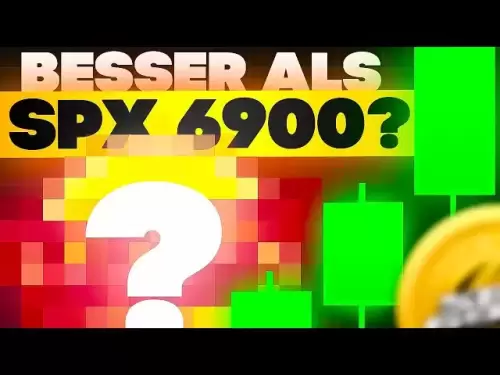-
 Bitcoin
Bitcoin $109,507.9823
0.43% -
 Ethereum
Ethereum $2,716.0274
3.79% -
 Tether USDt
Tether USDt $1.0003
-0.01% -
 XRP
XRP $2.3859
3.05% -
 BNB
BNB $665.2705
0.56% -
 Solana
Solana $154.6874
1.56% -
 USDC
USDC $1.0002
0.02% -
 TRON
TRON $0.2896
1.05% -
 Dogecoin
Dogecoin $0.1738
1.67% -
 Cardano
Cardano $0.6117
3.72% -
 Hyperliquid
Hyperliquid $40.3052
3.82% -
 Sui
Sui $2.9817
2.08% -
 Bitcoin Cash
Bitcoin Cash $505.0944
0.71% -
 Chainlink
Chainlink $14.0820
1.96% -
 Stellar
Stellar $0.2902
12.90% -
 UNUS SED LEO
UNUS SED LEO $9.0423
-0.34% -
 Avalanche
Avalanche $18.7084
1.54% -
 Hedera
Hedera $0.1714
6.33% -
 Shiba Inu
Shiba Inu $0.0...01218
2.48% -
 Toncoin
Toncoin $2.8261
1.24% -
 Litecoin
Litecoin $88.8228
1.59% -
 Monero
Monero $319.1344
2.71% -
 Polkadot
Polkadot $3.5479
2.69% -
 Dai
Dai $1.0001
0.00% -
 Ethena USDe
Ethena USDe $1.0010
0.06% -
 Uniswap
Uniswap $8.2690
6.49% -
 Bitget Token
Bitget Token $4.3622
1.19% -
 Aave
Aave $298.5989
2.11% -
 Pepe
Pepe $0.0...01042
1.97% -
 Pi
Pi $0.4663
1.15%
Does the Bitcoin payment platform support smart contracts? What are the application scenarios?
Bitcoin supports smart contracts through its scripting language, enabling applications like escrow services, decentralized exchanges, and payment channels.
Apr 20, 2025 at 05:14 pm

The question of whether the Bitcoin payment platform supports smart contracts and the potential application scenarios for such technology is a topic of significant interest within the cryptocurrency community. In this article, we will delve into the specifics of Bitcoin's smart contract capabilities, explore the mechanisms behind them, and discuss various application scenarios where these smart contracts can be utilized.
Understanding Bitcoin's Smart Contract Capabilities
Bitcoin, primarily known as a decentralized digital currency, does indeed support a form of smart contracts. Unlike Ethereum, which is renowned for its robust smart contract platform, Bitcoin's smart contract functionality is more limited but still significant. Bitcoin's smart contracts are primarily facilitated through its scripting language, which allows for conditional transactions.
Bitcoin's scripting language is not Turing-complete, meaning it cannot support loops or complex computations. However, it is capable of enforcing certain conditions on transactions, which can be considered a form of smart contract. These conditions can include multi-signature requirements, time locks, and other conditional logic.
How Bitcoin Smart Contracts Work
Bitcoin smart contracts operate through the use of scripts that are attached to transactions. These scripts define the conditions under which the transaction can be spent. Here's a breakdown of how they work:
ScriptPubKey and ScriptSig: In Bitcoin, each transaction output has a ScriptPubKey (locking script) that must be satisfied by a corresponding ScriptSig (unlocking script) to spend the output. The ScriptPubKey sets the conditions for spending, while the ScriptSig provides the data to meet those conditions.
Multi-signature (Multi-sig) Wallets: One of the most common uses of Bitcoin smart contracts is in multi-signature wallets. These require multiple signatures (from different keys) to authorize a transaction. For instance, a 2-of-3 multi-sig wallet requires two out of three possible signatures to move funds.
Time Locks: Bitcoin smart contracts can also include time locks, which prevent transactions from being spent until a certain time or block height. There are two types of time locks: nLockTime and CheckLockTimeVerify (CLTV). The former delays the entire transaction, while the latter can be used to delay specific outputs.
Hash Locks: Another feature is the use of hash locks, which require the recipient to provide a cryptographic hash to unlock the funds. This is often used in conjunction with time locks to create more complex conditional transactions.
Application Scenarios for Bitcoin Smart Contracts
Bitcoin's smart contract capabilities, while limited, still open up a variety of practical applications. Here are some of the key scenarios where Bitcoin smart contracts can be effectively utilized:
Escrow Services
Escrow services are a prime example of Bitcoin smart contracts in action. In an escrow arrangement, a third party holds funds until certain conditions are met. With Bitcoin, this can be automated using a multi-sig wallet where the buyer, seller, and a neutral third party all have keys. The transaction can only be completed when the buyer and seller agree, or if the third party steps in to resolve a dispute.
- Setting Up an Escrow: To set up an escrow using Bitcoin smart contracts, you would typically follow these steps:
- Create a multi-sig address with keys from the buyer, seller, and a trusted third party.
- The buyer sends funds to this multi-sig address.
- Once the transaction is complete or a dispute is resolved, the appropriate parties sign the transaction to release the funds.
Decentralized Exchanges
Decentralized exchanges (DEXs) can also leverage Bitcoin smart contracts to facilitate trading without a central authority. Atomic swaps, which are enabled by hash locks and time locks, allow for trustless exchanges between different cryptocurrencies.
- Performing an Atomic Swap: To perform an atomic swap, you would:
- Agree on the terms of the swap with the counterparty.
- Both parties lock their respective funds using a hash lock and time lock.
- Once the hashes are revealed and verified, the funds are swapped automatically.
Payment Channels
Payment channels are another application of Bitcoin smart contracts, enabling faster and cheaper microtransactions. By opening a payment channel, users can conduct multiple transactions off-chain and then settle them on the blockchain in a single transaction.
- Opening a Payment Channel: To open a payment channel, you would:
- Fund a multi-sig address with the initial amount.
- Conduct off-chain transactions by updating the balance between the parties.
- Close the channel by broadcasting the final state of the channel to the blockchain.
Time-Locked Transactions
Time-locked transactions can be used for various purposes, such as inheritance planning or ensuring funds are only accessible after a certain period. For example, a user might set up a transaction that can only be spent after a certain date, ensuring their heirs can access the funds at a later time.
- Setting Up a Time-Locked Transaction: To set up a time-locked transaction, you would:
- Create a transaction with an output that includes a CLTV script.
- Broadcast the transaction to the blockchain.
- The funds will be locked until the specified time or block height is reached.
Limitations and Considerations
While Bitcoin's smart contracts offer valuable functionality, it's important to understand their limitations. The lack of a Turing-complete scripting language means that complex conditional logic and loops are not possible. This limits the scope of what can be achieved compared to platforms like Ethereum.
Additionally, security is a critical consideration. Writing scripts for Bitcoin smart contracts requires careful attention to detail to avoid vulnerabilities. Any mistake in the script can lead to funds being locked permanently or stolen.
Frequently Asked Questions
Q: Can Bitcoin smart contracts be used for more complex financial instruments like options or futures?
A: Due to the limitations of Bitcoin's scripting language, it is not currently possible to implement complex financial instruments like options or futures directly on the Bitcoin blockchain. These require more advanced smart contract capabilities, such as those offered by Ethereum.
Q: Are there any tools or platforms that can help in creating Bitcoin smart contracts?
A: Yes, there are several tools and platforms designed to assist in creating Bitcoin smart contracts. For example, Bitcoin Script and Electrum provide interfaces for writing and testing scripts. Additionally, platforms like Blockstream offer more advanced tools for building and deploying Bitcoin smart contracts.
Q: How do Bitcoin smart contracts compare to those on other blockchains like Ethereum?
A: Bitcoin smart contracts are less flexible and powerful compared to those on Ethereum. Ethereum's smart contracts can execute complex logic and support decentralized applications (dApps), whereas Bitcoin's are more suited for simple conditional transactions and basic financial operations.
Q: Can Bitcoin smart contracts be used to enforce legal agreements?
A: While Bitcoin smart contracts can enforce certain conditions on transactions, they are not a substitute for legal agreements. They can be part of a broader legal framework, but they do not inherently have legal enforceability. Legal agreements typically require additional off-chain mechanisms to be fully enforceable.
Disclaimer:info@kdj.com
The information provided is not trading advice. kdj.com does not assume any responsibility for any investments made based on the information provided in this article. Cryptocurrencies are highly volatile and it is highly recommended that you invest with caution after thorough research!
If you believe that the content used on this website infringes your copyright, please contact us immediately (info@kdj.com) and we will delete it promptly.
- NEXBRIDGE, NEXPLACE, and the Bitcoin Ecosystem: Building a New Financial Frontier
- 2025-07-09 23:10:13
- MEXC Launchpad & PUMP Token: Grab a 40% Discount?
- 2025-07-09 22:50:12
- Trade System Revolution: How XDC and the End of Faxes Are Reshaping Finance
- 2025-07-09 23:10:13
- Ripple, CLARITY Act, and the XRP Case: A New York Minute on Crypto Regulation
- 2025-07-09 23:50:12
- No Rs 50 Coin? Delhi HC Hears Why India Prefers Banknotes
- 2025-07-09 23:15:11
- No Rs 50 Coin? Delhi HC Hears Why Banknotes Reign Supreme
- 2025-07-09 23:50:12
Related knowledge

How to customize USDT TRC20 mining fees? Flexible adjustment tutorial
Jun 13,2025 at 01:42am
<h3>Understanding USDT TRC20 Mining Fees</h3><p>Mining fees on the TRON (TRC20) network are essential for processing transactions. U...

USDT TRC20 transaction is stuck? Solution summary
Jun 14,2025 at 11:15pm
<h3>Understanding USDT TRC20 Transactions</h3><p>When users mention that a USDT TRC20 transaction is stuck, they typically refer to ...

How to cancel USDT TRC20 unconfirmed transactions? Operation guide
Jun 13,2025 at 11:01pm
<h3>Understanding USDT TRC20 Unconfirmed Transactions</h3><p>When dealing with USDT TRC20 transactions, it’s crucial to understand w...

How to check USDT TRC20 balance? Introduction to multiple query methods
Jun 21,2025 at 02:42am
<h3>Understanding USDT TRC20 and Its Importance</h3><p>USDT (Tether) is one of the most widely used stablecoins in the cryptocurrenc...

What to do if USDT TRC20 transfers are congested? Speed up trading skills
Jun 13,2025 at 09:56am
<h3>Understanding USDT TRC20 Transfer Congestion</h3><p>When transferring USDT TRC20, users may occasionally experience delays or co...

The relationship between USDT TRC20 and TRON chain: technical background analysis
Jun 12,2025 at 01:28pm
<h3>What is USDT TRC20?</h3><p>USDT TRC20 refers to the Tether (USDT) token issued on the TRON blockchain using the TRC-20 standard....

How to customize USDT TRC20 mining fees? Flexible adjustment tutorial
Jun 13,2025 at 01:42am
<h3>Understanding USDT TRC20 Mining Fees</h3><p>Mining fees on the TRON (TRC20) network are essential for processing transactions. U...

USDT TRC20 transaction is stuck? Solution summary
Jun 14,2025 at 11:15pm
<h3>Understanding USDT TRC20 Transactions</h3><p>When users mention that a USDT TRC20 transaction is stuck, they typically refer to ...

How to cancel USDT TRC20 unconfirmed transactions? Operation guide
Jun 13,2025 at 11:01pm
<h3>Understanding USDT TRC20 Unconfirmed Transactions</h3><p>When dealing with USDT TRC20 transactions, it’s crucial to understand w...

How to check USDT TRC20 balance? Introduction to multiple query methods
Jun 21,2025 at 02:42am
<h3>Understanding USDT TRC20 and Its Importance</h3><p>USDT (Tether) is one of the most widely used stablecoins in the cryptocurrenc...

What to do if USDT TRC20 transfers are congested? Speed up trading skills
Jun 13,2025 at 09:56am
<h3>Understanding USDT TRC20 Transfer Congestion</h3><p>When transferring USDT TRC20, users may occasionally experience delays or co...

The relationship between USDT TRC20 and TRON chain: technical background analysis
Jun 12,2025 at 01:28pm
<h3>What is USDT TRC20?</h3><p>USDT TRC20 refers to the Tether (USDT) token issued on the TRON blockchain using the TRC-20 standard....
See all articles

























































































